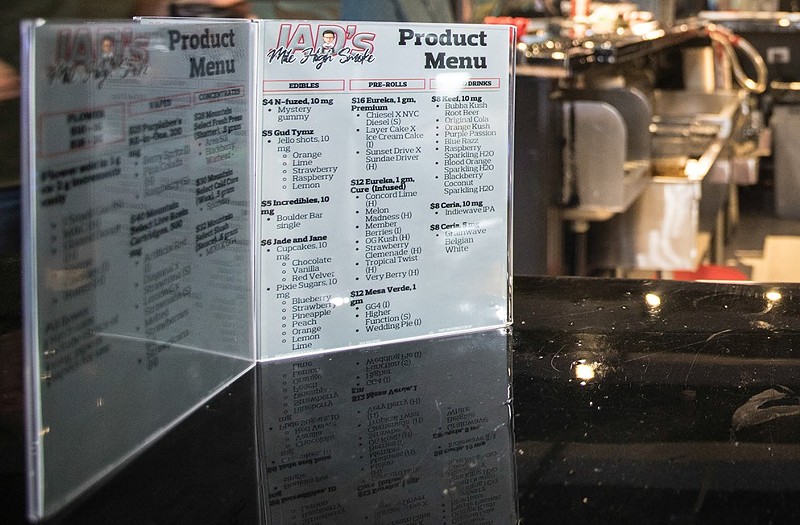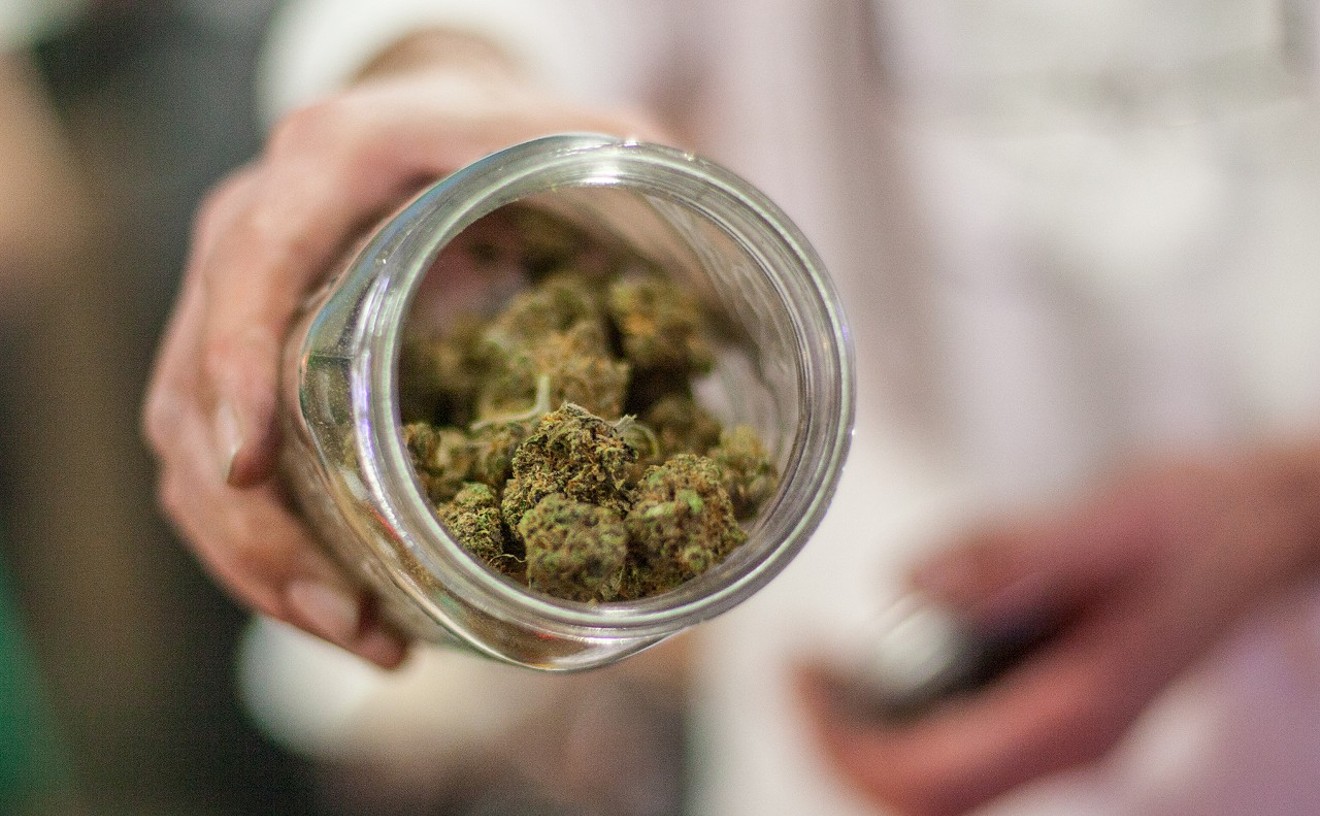Declining retail marijuana sales in Colorado could pause millions of dollars in school construction grants, according to lawmakers and the state Department of Education.
Colorado dispensary sales increased for seven straight years after recreational sales began in 2014, topping out at nearly $2.23 billion in 2021, according to the state Department of Revenue. Marijuana sales began dropping after the pandemic ended, however, decreasing about 20 percent from 2021 to 2022, and then another 14.5 percent from 2022 to 2023.
Annual tax revenue from marijuana sales and business licensing fees has experienced a similar decline, falling almost 46 percent from 2021 to 2023. But lawmakers continued going to the well of marijuana revenue for bill funding, according to State Representative Rick Taggert, and now a crunch has hit.
Taggert, a college professor who represents Mesa County, is sponsoring a bill that would pause an annual $20 million transfer from the state's Marijuana Tax Cash Fund to the Building Excellent Schools Today (BEST) fund, a matching grant program intended to help spur new construction at Colorado schools.
If passed, the measure would hold the transfer from this year until 2026, but the lost funds would eventually be paid back.
"It comes about strictly from the standpoint that the Marijuana Tax Cash Fund has been overly tapped over these past few years, and we need to allow that cash fund to build its reserve again before making another transfer to the public school capital construction systems fund," Taggert told the House Appropriations Committee during a March 27 hearing.
Annually, the BEST fund also receives either $40 million or 90 percent of the state’s 15 percent wholesale and excise tax revenue on recreational pot sales, whichever is greater. According to the Department of Education, those annual transfers will still happen.
"If passed, the transfer delay in HB 24-1395 would reduce the available dollars for fiscal year 2025 BEST grants by $20 million. Following the transfer in 2026, however, available dollars for future grants would increase by $20 million," a statement from the department reads. "BEST grants are made available to all public school districts, charter schools, institute charter schools, boards of cooperative educational services and the Colorado School for the Deaf and Blind for projects that are implemented at a local level."
The bill was passed by the Appropriations Committee and is scheduled for its first House floor vote on April 1.
As of January, the BEST fund had received over $580 million from marijuana tax revenue since recreational sales began in 2014, according to the Department of Education, with 56 requests for a total of $658 million in the 2024 fiscal year alone. Schools must match the grant amount in order to receive BEST funds.
As marijuana sales decline in Colorado, both the state and local governments are coming to grips with a drying well of funding. In Aurora, where around 25 dispensaries operate, marijuana tax revenue allocations are expected to decrease from around $3 million annually in 2021 and 2022 to $1.5 million in 2023, according to city officials, impacting the city's homelessness services.
Denver marijuana revenue has dropped as well, going from nearly $73 million in 2021 to $54.8 million in 2022, according to the Denver Department of Excise & Licenses, which hasn't published 2023's numbers yet.
Last year the City of Denver announced it would be allocating 1 percent of local marijuana sales tax from 2023 to 2025 to the Herman Malone Fund, created by former Mayor Michael Hancock's administration and the city's Economic Development & Opportunity department (DEDO) in partnership with Domestic Emerging Market Investments (DEMI).
At the time, the pot -ax allocation was estimated to generate between $4 to $5 million annually. However, DEMI has since sued the city, alleging that payments stopped last November after only a portion of the promised money had arrived.
"Sales of legal marijuana in Colorado are way down, and have been for over two years. That means that marijuana tax revenues are down as well," says Truman Bradley, executive director of Marijuana Industry Group (MIG). "But if the state wants to continue to have marijuana tax dollars for important projects such as BEST, it's time to right-size the fees, regulations and the tax structures that have contributed to the legal marijuana industry decline."
Bradley and MIG are currently advocating for a separate bill in the Colorado Legislature that would "streamline" certain marijuana business regulations, including recordkeeping, hiring practices and license renewal, among other changes intended to loosen industry rules.
[
{
"name": "Air - MediumRectangle - Inline Content - Mobile Display Size",
"component": "12017618",
"insertPoint": "2",
"requiredCountToDisplay": "2",
"watchElement": ".fdn-content-body",
"astAdList": [
{
"adType": "rectangle",
"displayTargets": "mobile"
}
]
},{
"name": "Editor Picks",
"component": "17242653",
"insertPoint": "4",
"requiredCountToDisplay": "1",
"watchElement": ".fdn-content-body",
"astAdList": [
{
"adType": "rectangle",
"displayTargets": "desktop|tablet"
},{
"adType": "rectangle",
"displayTargets": "desktop|tablet|mobile"
}
]
},{
"name": "Inline Links",
"component": "18838239",
"insertPoint": "8th",
"startingPoint": 8,
"requiredCountToDisplay": "7",
"maxInsertions": 25
},{
"name": "Air - MediumRectangle - Combo - Inline Content",
"component": "17261320",
"insertPoint": "8th",
"startingPoint": 8,
"requiredCountToDisplay": "7",
"maxInsertions": 25,
"watchElement": ".fdn-content-body",
"astAdList": [
{
"adType": "rectangle",
"displayTargets": "desktop|tablet"
},{
"adType": "rectangle",
"displayTargets": "desktop|tablet|mobile"
}
]
},{
"name": "Inline Links",
"component": "18838239",
"insertPoint": "8th",
"startingPoint": 12,
"requiredCountToDisplay": "11",
"maxInsertions": 25
},{
"name": "Air - Leaderboard Tower - Combo - Inline Content",
"component": "17261321",
"insertPoint": "8th",
"startingPoint": 12,
"requiredCountToDisplay": "11",
"maxInsertions": 25,
"watchElement": ".fdn-content-body",
"astAdList": [
{
"adType": "leaderboardInlineContent",
"displayTargets": "desktop|tablet"
},{
"adType": "tower",
"displayTargets": "mobile"
}
]
}
]












